Sainsbury's and Waitrose are the latest supermarkets to set their focus on the lucrative but niche wholefoods category in a bid to cash in on ever-increasing demand for healthier lines.
Waitrose is planning a new range in the sector after customer research identified a gap in its offer.
The move follows Tesco's entry into the sector last year, with Wholefoods-branded nuts, seeds and exotic foods including quinoa, mung beans and black turtle beans.
A spokeswoman for Waitrose said: "This is as a response to our customers' desire for natural foods that contribute to a nutritionally balanced diet."
Although she would not give details of the size or breadth of the range, this month the supermarket filed Waitrose Wholesome as a trademark at The Patent Office for use under a number of categories. These include meat, fish and cooking oils and snack foods such as nuts and pulses.
Meanwhile, Sainsbury's appears to be planning a similar range, having filed variations of the phrase 'super natural' as a trademark in the same week. The name has been registered under a variety of food and other grocery categories, including vegetables, nuts and seeds, as well as food for babies and toiletries. The supermarkets' mass move into wholefoods comes ahead of the entry into the UK early next year of US natural food chain Whole Foods Market. Its first store, on London's Kensington High Street, is to act as a springboard for a national UK chain and into the rest of Europe.
Nick Gladding, a senior analyst at Verdict, said the entry of Whole Foods Market was likely to be the biggest threat to Waitrose due to the similarity in their target markets.
"By developing a brand for the wholefoods style of product, it gives the supermarkets authority in that area. It's no longer just about organic or healthy. Customers are buying into wholefoods and expect retailers to have them."



















No comments yet